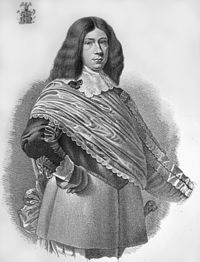
Ulrik Christian Gyldenløve (1630-1658)
Encyclopedia

Christian IV of Denmark
Christian IV was the king of Denmark-Norway from 1588 until his death. With a reign of more than 59 years, he is the longest-reigning monarch of Denmark, and he is frequently remembered as one of the most popular, ambitious and proactive Danish kings, having initiated many reforms and projects...
and his chambermaid and mistress
Mistress (lover)
A mistress is a long-term female lover and companion who is not married to her partner; the term is used especially when her partner is married. The relationship generally is stable and at least semi-permanent; however, the couple does not live together openly. Also the relationship is usually,...
Vibeke Kruse
Vibeke Kruse
Vibeke Kruse was the official mistress of King Christian IV of Denmark between 1629 and 1648 and the mother of one of his three acknowledged, illegitimate sons, Ulrik Christian Gyldenløve. She was described as influential.- Biography :...
.
In February 1645, Gyldenløve was given the estate Skinnerup gård by his father. He was not impressed with its name nor its derelict condition. He rebuilt the manor and renamed it Ulriksholm. He was subsequently made a count
Count
A count or countess is an aristocratic nobleman in European countries. The word count came into English from the French comte, itself from Latin comes—in its accusative comitem—meaning "companion", and later "companion of the emperor, delegate of the emperor". The adjective form of the word is...
.
Gyldenløve was general
General
A general officer is an officer of high military rank, usually in the army, and in some nations, the air force. The term is widely used by many nations of the world, and when a country uses a different term, there is an equivalent title given....
of the Realm and commander-in-chief of the Danish army during the Dano-Swedish War of 1657–1658. Ulrik led the charge of a student army against the Swedish army during the siege of Copenhagen
Copenhagen
Copenhagen is the capital and largest city of Denmark, with an urban population of 1,199,224 and a metropolitan population of 1,930,260 . With the completion of the transnational Øresund Bridge in 2000, Copenhagen has become the centre of the increasingly integrating Øresund Region...
in 1658. When the Swedes stormed Kallebodstrand in Copenhagen, where Gyldenløve had his headquarters, a bloody struggle was fought between the Danish-Dutch defenders and the Swedish-German attackers. Gyldenløve was slain by several enemy gunshots.
The Gyldenløvesgade streets in Copenhagen and Odense
Odense
The city of Odense is the third largest city in Denmark.Odense City has a population of 167,615 and is the main city of the island of Funen...
are named after him. Gyldenløve was remembered by the Danish nobility
Nobility
Nobility is a social class which possesses more acknowledged privileges or eminence than members of most other classes in a society, membership therein typically being hereditary. The privileges associated with nobility may constitute substantial advantages over or relative to non-nobles, or may be...
and peasant
Peasant
A peasant is an agricultural worker who generally tend to be poor and homeless-Etymology:The word is derived from 15th century French païsant meaning one from the pays, or countryside, ultimately from the Latin pagus, or outlying administrative district.- Position in society :Peasants typically...
ry as one of Denmark's foremost military commanders.
Christian V
Christian V of Denmark
Christian V , was king of Denmark and Norway from 1670 to 1699, the son of Frederick III of Denmark and Sophie Amalie of Brunswick-Lüneburg...
also had a son with the same name.

